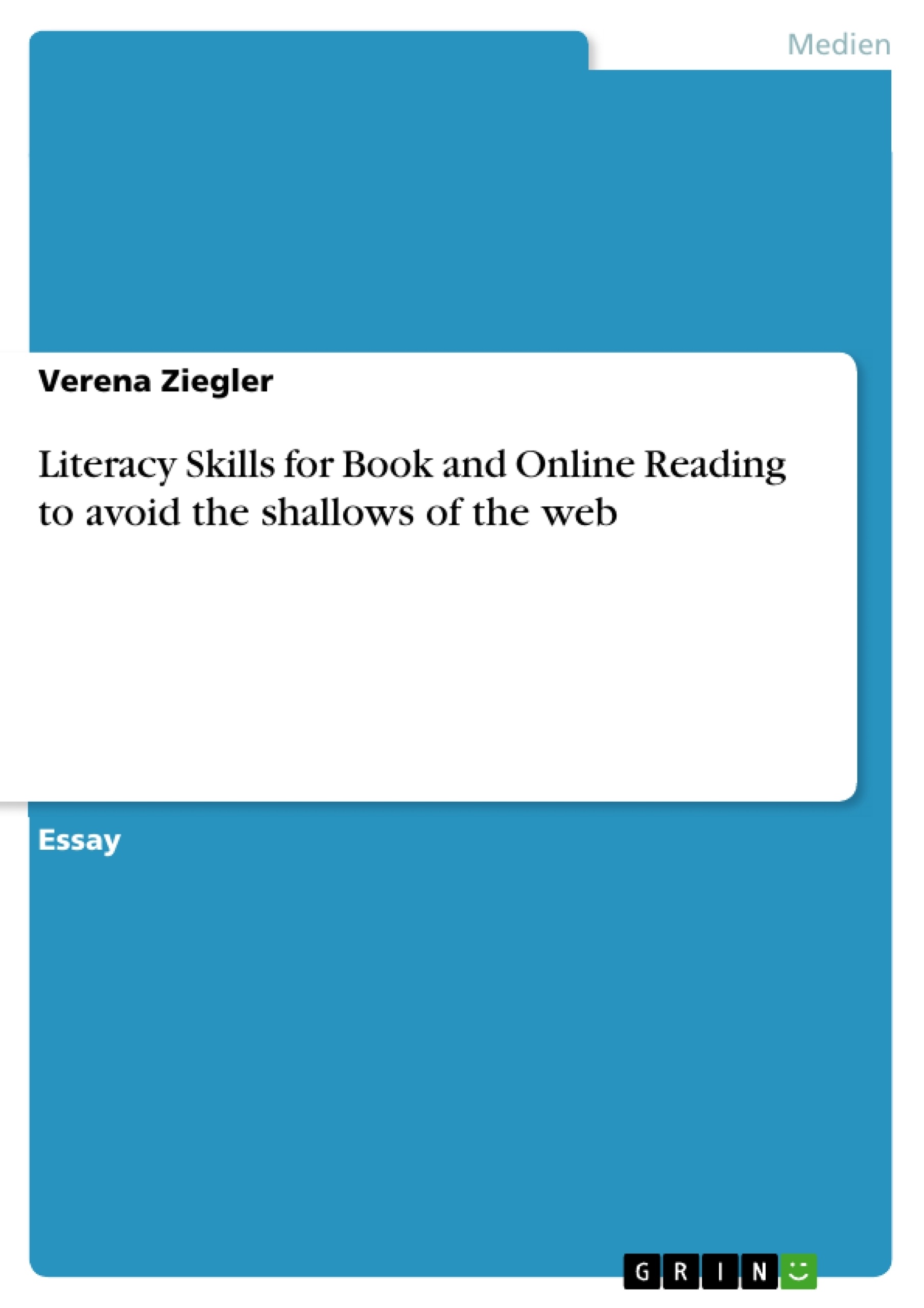This paper reflects on book and web literacy. In particular, the differences between online reading and book reading are outlined by referring to the differences in use of these two mediums and by taking into account the brain processes during reading. The reasons for the various kinds of literacy in regard to books and websites are described. Furthermore, there are some studies done in Germany about reading behaviours which led to the main question, which reading capabilities will be of importance in the future?
In regards to books, this essay does not differ between books readed as a printed version or on an electronical device such as the Kindle Wireless Reader or a similar item, this will not explicitly be considered as online reading.
To specify the meaning of online reading in this essay, all reading of websites, articles, blogs etc. on the web will be considered as online or web reading while disregarding the perception of digital books as there is less difference to reading printed books.
The theory of the knowledge gap was already described in the 1970ies: “The infusion of mass media information into a social system increases, segments of the population with higher socioeconomic status tend to acquire this information at a faster rate than the lower status segments, so that the gap in knowledge between these segments tends to increase rather than decrease.”
At the moment the German society is confronted with a new risk of knowledge gap: the Digital Divide , an advanced term including the knowledge gap theory in regard to the internet and also taken into account the diffusion of personal computers and other electronical devices to access the internet. As discussed in chapter 2.4 efficient online reading requires certain skills as the “navigation and orientation within nonlinear structures seems to rely on the reader’s ability to mentally represent the top-level structure of the hypertext.” This is easier for higher educated and more literate people than for people with a lower proficiency level. Especially as the use of the web is still increasing, online literacy skill will become more important for the access to relevant information in the future.
assumed that the user knows how to use it.
The German reading foundation “Stiftung Lesen“ will incorporate the findings of brain science in their activities for advancing reading and reading capability. But the challenge and responsibility is not only at the organizations and institutions...
Inhaltsverzeichnis
- 1. Introduction
- 2. Reading, thinking and learning.
- 2.1 Book and web literary
- 2.2 The human brain and how it learns:
- 2.3 Characteristics of book reading...
- 2.4 Characteristics of online reading........
- 3. Literacy in Germany....
- 3.1 Internet usage in Germany:
- 3.2 Reading behaviour in Germany......
- 3.3 Web literacy in Germany
- 4. Conclusion: Risk of broadening the knowledge gap and getting lost in the shallows of the web
Zielsetzung und Themenschwerpunkte
Dieser Essay untersucht die Unterschiede zwischen der Lesefertigkeit im Bereich von Büchern und im Web. Dabei werden die unterschiedlichen Nutzungsweisen der beiden Medien sowie die Gehirnaktivitäten beim Lesen betrachtet. Des Weiteren werden verschiedene Arten der Lesefertigkeit in Bezug auf Bücher und Websites beschrieben. Basierend auf Studien zum Leseverhalten in Deutschland wird die Frage aufgeworfen, welche Lesekompetenzen in Zukunft relevant sein werden.
- Unterschiede zwischen Online- und Buchlesen
- Einfluss von Online- und Buchlesen auf Denkprozesse
- Entwicklung der Lesefertigkeit in Deutschland
- Zukünftige Bedeutung von Lesekompetenzen
- Risiken der Wissenskluft und des "Verirrens in den Untiefen des Webs"
Zusammenfassung der Kapitel
- Kapitel 1: Introduction
Die Einleitung stellt den Gegenstand des Essays, die Analyse von Buch- und Web-Lesefertigkeit, vor. Sie hebt die Unterschiede zwischen Online- und Buchlesen hervor und beschreibt die im Essay behandelten Themen.
- Kapitel 2: Reading, thinking and learning.
Dieses Kapitel beleuchtet die unterschiedlichen Arten des Lesens in der heutigen Zeit. Es wird die Unterscheidung zwischen konzentriertem, tiefem Lesen in Büchern und dem selektiven, zielgerichteten Scannen von Texten im Internet behandelt. Es wird auch diskutiert, ob die Art des Lesens Auswirkungen auf Denkprozesse hat.
- Kapitel 3: Literacy in Germany....
Kapitel 3 konzentriert sich auf die Lesefertigkeit in Deutschland. Es werden die Internetnutzung, das Leseverhalten und die Web-Lesefertigkeit in Deutschland untersucht. Die Ergebnisse von Studien zum Leseverhalten werden vorgestellt.
Schlüsselwörter
Die Schlüsselwörter dieses Essays sind: Lesefertigkeit, Buchlesen, Online-Lesen, Web-Lesefertigkeit, Denkprozesse, Internetnutzung, Leseverhalten, Wissenskluft, Untiefen des Webs.
Häufig gestellte Fragen
Was ist der Unterschied zwischen Buch- und Online-Lesen?
Buchlesen ist oft durch konzentriertes, tiefes Lesen geprägt, während Online-Lesen häufig aus selektivem Scannen und Navigieren durch nichtlineare Hypertext-Strukturen besteht.
Beeinflusst Online-Lesen unsere Denkprozesse?
Der Essay diskutiert, wie die unterschiedlichen Anforderungen an das Gehirn beim Scannen von Webseiten im Vergleich zum tiefen Lesen von Büchern die Art und Weise verändern können, wie wir Informationen verarbeiten.
Was versteht man unter der 'Digitalen Kluft' (Digital Divide)?
Es beschreibt das Risiko, dass die Wissenskluft zwischen Bevölkerungsschichten wächst, da effizientes Online-Lesen spezifische Fähigkeiten erfordert, die höher gebildeten Personen leichter fallen.
Welche Lesekompetenzen werden in Zukunft wichtig sein?
Neben der klassischen Lesekompetenz wird die 'Web Literacy' – also die Fähigkeit, relevante Informationen im Internet zu finden, zu bewerten und einzuordnen – immer bedeutender.
Gilt das Lesen auf einem Kindle als Online-Lesen?
In diesem Essay wird das Lesen digitaler Bücher (z.B. auf dem Kindle) eher dem Buchlesen zugeordnet, da die Struktur des Textes linear bleibt, anders als bei Webseiten oder Blogs.
- Arbeit zitieren
- Dipl-Betriebsw. (DH) Verena Ziegler (Autor:in), 2011, Literacy Skills for Book and Online Reading to avoid the shallows of the web, München, GRIN Verlag, https://www.grin.com/document/187253



